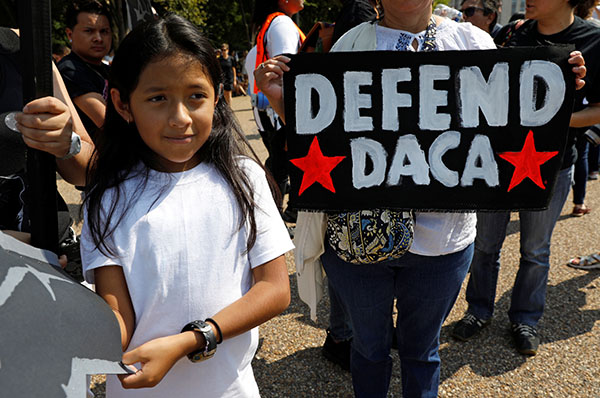Trump announces decision to end DACA

Protesters were found in multiple cities around the U.S., defending DACA and it’s representatives.
September 15, 2017
800,000 people are represented under DACA. But, as Pres. Donald Trump announced his decision to end DACA, 800,000 of our fellow Americans could possibly face deportation.
In 2012, the Obama-Administration established DACA (Deferred Action for Childhood Arrivals). People represented under DACA, also known as “Dreamers,” are undocumented minors who came to the U.S. as children and are given a two-year renewable visa. DACA members receive amnesty to stay in the U.S. and are given opportunities and rights like a social security number, work permits and the ability to apply for credit cards and licenses.
DACA members must attend high school, earn their diploma and/or be a member of the military.
Trump’s decision was imminent, rooting from his known beliefs of illegal immigration into the U.S. Supporters of Trump’s decision claim that DACA promotes illegal immigration, and offers unfair protection to these “undocumented aliens.” Trump also claims that DACA gives opportunities to “illegals” that the American people truly deserve.
“We will resolve the DACA issue with heart and compassion — but through the lawful Democratic process — while at the same time ensuring that any immigration reform we adopt provides enduring benefits for the American citizens we were elected to serve,” said Trump, according to CNN. “We must also have heart and compassion for unemployed, struggling and forgotten Americans.”
On Thursday morning, Sept. 14th, news was released that democrats and Trump had a meeting concerning DACA, but Trump claims that this meeting was merely a discussion with no negotiation involved. According to CNN, Senator Chuck Schumer and Representative Nancy Pelosi claimed that they had “agreed to enshrine the protections of DACA into law quickly.” Trump responded to this by tweeting that “no deal was made” on DACA.
Trump says that Congress has six months to pass legislation preserving parts of DACA before he would completely terminate the program. Many are worried for what the future holds. Young adults and children could potentially have to leave their lives that they’ve established here in the U.S. if DACA ends.








